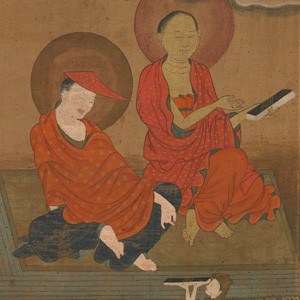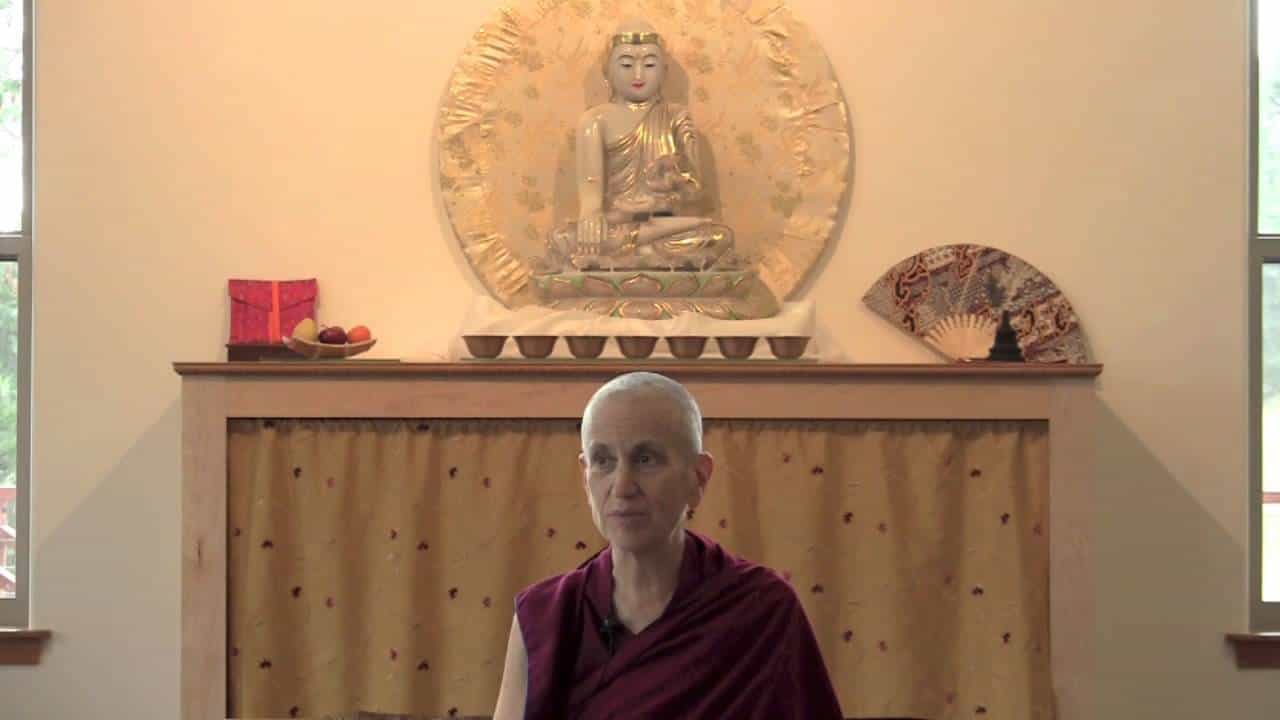Verse 75: True heroes
Part of a series of talks on Gems of Wisdom, a poem by the Seventh Dalai Lama.
- Courage in not being lured by things that glitter
- Possessions and societal status spark our attachment and desire
- Becoming fixated on the glitter takes us away from Dharma practice
- Thinking about the disadvantages of attachment
Gems of Wisdom: Verse 75 (download)
“Who is the hero never beaten by any external power?” It’s not Rambo. It’s not Superman. “The sage whose mind is never lured by the things that glitter.”
Who is the hero never beaten by any external power?
The sage whose mind is never lured by the things that glitter.
I remember, many years ago, when I first met the Dharma, going on a retreat and watching my teacher walk up the aisle to the front of the room. And he’s small. In those years he was very thin. And he always walked with his head down and his hand in a certain way. So he’s not somebody you would kind of necessarily notice or think was a brave soldier, you know? And yet I remember thinking that he’s the one who’s really courageous, because of this thing of not being lured by anything that glitters, and being completely determined very clean clear on his Dharma path. So, although other people are worldly brave…. “The hero never beaten by any external power.” Even though regular soldiers are considered “brave” [in quotes] they’re defeated by external powers I mean literally, because they can get killed. And also because they’re completely controlled by what’s happening in the external world. So their minds are uncontrolled, and so they’re betwixt and beguiled by external things.
The motivation you [in the audience] gave yesterday night before the Tara puja where you were saying in World War I, that in some places throughout Europe on Christmas they called a truce one day, and so the British soldiers and the German soldiers were out there drinking beer and lighting each other’s cigarettes and chatting. Whereas the previous day they were trying to kill each other. And the next day they would be trying to kill each other. So if that isn’t being controlled by the external world, you know, what is? Because what they’re doing makes absolutely no sense. I mean, if you’re friendly with a person why were you trying to kill him and why will you try and kill him? And you don’t even know the people, so why are you trying to kill them?
But somebody who’s a Dharma practitioner doesn’t get extracted by the external objects, and especially by things that glitter.
The glitter refers to all the stuff that sparks our attachment and desire. So of course it could be possessions. And we’re coming into the holiday season so there’s lots of glitter everywhere. And we’re supposed to buy things and overeat and do all this stuff. Which….
I don’t know how happy people are. My impression of Christmas season is that people are all running around being frantic. And frantically trying to get all the presents and all the food, to have all the family, without them fighting, have a good time. So there’s something not quite what I associate with being peaceful and harmonious about the holiday season. Because everybody’s, “I’ve got to go to this party, I’ve got to go to that party, and if I don’t show up at my work party then they’re going to think I’m unfriendly, but the work party is the same night as my golfing club party, and which one am I going to go to? And how am I going to afford all these presents? I’m already in credit card debt, and my kids want all this stuff, which they don’t really need, but if I don’t get it for them then they’re going to say so-and-so’s parents gets it for them, for their friends, why don’t I do it? Then my kids won’t like me….” And it goes on and on, you know? So, getting caught up in the glitter of possessions.
Another thing of glitter is societal status. To be recognized. Whatever we want to achieve, to be recognized as an expert or as somebody knowledgeable in whatever field it is. And wouldn’t it be nice if you go somewhere…. You know, maybe it’s your bonsai club and you go to a bigger bonsai conference and somebody says, “Oh, I heard about you. You grow beautiful bonsais.” “Oh yes!” You know?
We may laugh at that, but for a person who grows bonsais for a hobby that’s really serious. So whatever we do for a hobby, that we of course think is more important than growing bonsais, like going skateboarding. Definitely more sophisticated than bonsai trees. [Laughter] Or whatever your hobby is. Painting watercolors, drumming…. You want to be known as somebody who’s really good in that amongst the people, and acknowledged for that. And in your office you want to be offered promotions, you know? It’s like, “Oh, a status symbol. I was offered a promotion.” And kind of, “Oh, that must mean I’m really good.” So that’s part of the glitter, too.
And of course, the most enticing of the glitter are romantic relationships. That’s just like “Wow.” Over-the-top glitter. “Now somebody loves me, now all these daydreams I’ve been having for so long now are totally fulfilled, forever and ever.”
Until the next fight.
But anyway, we get caught up by the glitter, don’t we? And we get defeated by the glitter because we say, “Well I want to practice the Dharma,” but then when worldly glitter kind of shines just even a little bit in our eyesight like this, then instead of saying, “okay, it’s just there in the background, let it go,” we go like [turn and stare at it] and fixate on it, and then off we go in that direction, and our Dharma practice gets abandoned. And it just goes bye-bye because we’re chasing some kind of worldly glitter.
In that way we are not heroes because we are completely defeated by this kind of worldly glitter. And it’s very hard to stand up to it because the appearance of this life is so strong that we think that’s all there is, at this particular moment, is only the glitter that is appearing to my senses at this moment. We don’t even think a day in advance, or a year in advance. We don’t think about the results of our actions. We don’t think about the karma we create and what kind of rebirth we’re going to have. We just get totally fixated on whatever thing appears before us that we think will bring us pleasure. And so that’s why we’re not the “hero who’s never beaten by any external power.”
But, slowly slowly, by seeing the disadvantages of just following objects of attachment, then slowly slowly we can start seeing them for what they are and stop following them. It’s like, if you have somebody who’s been really friendly towards you, and then you discover that they’ve been lying to you. At first it’s kind of hard. “No, they’re not really lying.” And you go on and on and then more and more it comes that they’re lying. And then at a certain point, after tolerating it for a while because you just really can’t believe that they’re lying, then you say, “No, I’m sure now. They’re lying.” And then you say, “Get out of here. You’ve been stealing my stuff all along.” Well in the same way, that’s the way attachment works. At first it’s our best friend. It brings us happiness. We get what we want with attachment. And then after you hear some Dharma teachings then you start to think about it, and it’s like, hmmm, “Attachment’s lying to me…. No! Not really. Attachment brings me happiness! It’s not deceiving me.” And then you go on a little bit longer and you keep watching it: “Oh, yes, well, hmmm…. Attachment is kind of, well, deceptive…. But not so bad.” And then you keep following it for a while and then at a certain point you just say, “You know, my attachment is one big liar. It’s been stealing from me all this time and I’ve put up with it, and I even thought it was my friend. But now I’m certain that it’s not. And so I’m going to release this attachment.”
The thing to release is the attachment. It doesn’t mean you don’t enjoy things. It doesn’t mean that you don’t have stuff and you don’t have friends, or anything like that. What it means is that you don’t have the attachment, thinking that these things are going to bring you ultimate happiness, and so you don’t create a lot of negative karma running after them. And you don’t get distracted from your Dharma practice because of running after them.
[In response to audience] Yes, so if you craved a Jaguar and you got it, and it still didn’t bring you happiness, well you just say, well, this wasn’t the right one to buy. I need another model. Or the other color would have been nicer. You know? So we always kind of fault whatever it is we get instead of realizing that the whole thing is a deceptive set-up.
[In response to audience] So in your decision about whether to move to the Abbey you kind of had that…. You were able to step back and observe your life and see it’s just one big run-around seeking pleasure, and that never really brought satisfaction or peace. Yes.
And it’s true. Without the Dharma that can tell us this we would probably never even notice it from our own experience. Because like you [in audience] said, we just think, well, it was the wrong thing. It was the person that I was married to. It was the job I had. It was the wrong color or wrong model car. You know? Instead of, you know, the problem is the clinging.
[In response to audience] At the time of death you might begin to get it. But then it’s totally too late, isn’t it? And actually, even then, some people, if the whole purpose of their life was to get all this wealth and physical objects, they get terrified of losing it at the time of death. Because it’s very clear that there’s no choice. You’ve got to separate from it. So terrified. Angry. Whatever.
Venerable Thubten Chodron
Venerable Chodron emphasizes the practical application of Buddha’s teachings in our daily lives and is especially skilled at explaining them in ways easily understood and practiced by Westerners. She is well known for her warm, humorous, and lucid teachings. She was ordained as a Buddhist nun in 1977 by Kyabje Ling Rinpoche in Dharamsala, India, and in 1986 she received bhikshuni (full) ordination in Taiwan. Read her full bio.


